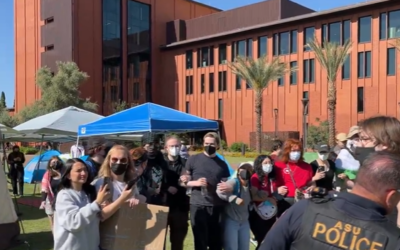By Daniel Stefanski |
A Republican State Senator is outraged after the Democrat Attorney General issued a recent response to a legislative inquiry about prevailing wage ordinances.
On Thursday, Democrat Attorney General Kris Mayes answered a 1487 complaint from Senator Catherine Miranda, who had previously asked if “a city may enact a prevailing wage ordinance that requires contractors on municipal public works contracts to pay their workers no less than the wage rates that prevail for their trade in their geographic location.”
Mayes affirmed that “a city may regulate the minimum wages paid within its geographic boundaries under Arizona Revised Statutes $ 23-364(1), so long as those wages are not less than the statewide minimum wage.” The attorney general added that “this authority includes the ability to require that employees of contractors on local public works projects be paid not less than the prevailing wage.”
This reply from Attorney General Mayes attracted the attention of one Republican lawmaker in particular, Senator T.J. Shope. The legislator took to Twitter to express his displeasure with the state’s top cop, writing, “This is a completely outside of the law interpretation by Attorney General Kris Mayes. If this were legal, why have the unions run bills at the Legislature every year to make prevailing wage legal, including a bill I once ran? I don’t have a problem with cities entering in to contracts with labor per se but do it the right way AND legally. My hope is a lawsuit will be filed immediately to challenge this ILLEGAL opinion by the AG. The AG should have run for Legislature if she wanted to enact law.”
Senator Shope may have been upset with Mayes’ opinion, but others around the state were not. Phoenix Councilwoman Laura Pastor tweeted, “Labor workers deserve to be compensated for their work. For years, I have consistently supported and pushed for prevailing wage – and I will continue to do so.”
Phoenix Vice Mayor Yassamin Ansari wrote, “Attorney General Mayes’ opinion is clear: cities may enact a prevailing wage ordinance to ensure that workers are paid fairly and competitively. I look forward to voting YES (again) for a strong Phoenix policy by the end of this year.”
Ansari’s comment was referencing a back-and-forth saga over a prevailing wage ordinance in the City of Phoenix earlier this year. In March, five members of the City’s Council voted to approve the Prevailing Wage Ordinance for City Projects to “ensure that (Phoenix’s) development growth is match with the skilled labor (the city) urgently needs when (Phoenix) invests in the growth of (its) communities.”
This action from Phoenix led to the threat of litigation from the Goldwater Institute, which sent an April letter to the Phoenix City Council to “express serious concerns” about the passage of the Ordinance, warning that if “the enacted version of the ordinance regulates matters that are expressly pre-empted by state law, it exposes the City to a high risk of litigation.” After the first Phoenix Council vote, there was a change in two seats, leading to another vote by the Council to repeal the Ordinance.
Mayor Kate Gallego was among the votes to repeal the Ordinance. She stated at the time, “I believe in doing things the right way, not the fast way, and that’s what we decided to do today. I am optimistic that we will find a path forward for better pay for construction workers while, at the same time, put sound policy on the books that survives legal challenges.”
Senator Miranda, the author of the 1487 complaint that generated Mayes’ opinion, seemed to have officials like Gallego in mind when she posted, “No hiding behind the fact it might be illegal. It’s not. Kris Mayes has spoken, “If two conflicting statutes cannot operate contemporaneously the more recent specific statute governs over [an] older more general statute.”
Daniel Stefanski is a reporter for AZ Free News. You can send him news tips using this link.








